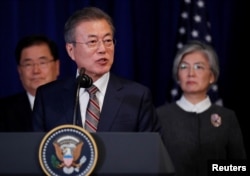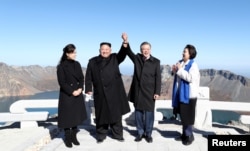The United States has called for the continued full enforcement of United Nations sanctions on North Korea after the two Koreas moved to establish rail and road links across their shared border and South Korean President Moon Jae-in continued to make the case for easing international sanctions against Pyongyang as it makes incremental progress toward denuclearization.
In a statement to South Korea’s Yonhap news agency Monday, a U.S. State Department spokesperson said, "We expect all member states to fully implement U.N. sanctions, including sectoral goods banned under U.N. Security Council resolutions, and expect all nations to take their responsibilities seriously to help end [North Korea’s] illegal nuclear and missile programs.”
Washington repeatedly has said that sanctions on North Korea will remain in place until Pyongyang abandons its nuclear weapons and ballistic missile programs. The United Nations sanctions currently in place on Pyongyang are designed to sever the resources necessary to develop the North’s weapons programs and deplete its cash reserves.
But Moon told France’s Le Figaro newspaper before leaving for a European tour, that over the course of his conversations with North Korean leader Kim Jong Un, the “meetings have convinced me that he has taken the strategic decision to abandon his nuclear weapons.”
"With the denuclearization of North Korea, by agreeing to destroy their nuclear arsenal, they need to have the confidence that they have made the right choice,” said Moon.
Speaking alongside French President Emanuel Macron, Moon added on Monday, “I believe the international community needs to provide assurances that North Korea has made the right choice to denuclearize and encourage North Korea to speed up the process.”
Sanctions to remain
Former U.S. Ambassador to South Korea Christopher Hill said that while the atmosphere on the peninsula has changed, that wasn't necessarily facilitated by Pyongyang.
“I think people who call for a reevaluation of sanctions need to explain how North Korea has somehow changed with respect to denuclearization,” Hill said.
“I'd like to hear the argument that suggests that they've done something in denuclearization,” Hill added.
Former U.S. National Security Advisor General H.R. McMaster recently said in Seoul, that “while we all hope that Chairman Kim Jong Un is undergoing a radical change of heart, we must remain alert.”
McMaster said the possibility remains that Kim intends to use his nuclear arsenal as a “‘treasured sword’ designed to pry apart the alliance between the United States and the Republic of Korea, by making America think twice about ever coming to South Korea’s aid in time of war.”
He added that in Kim’s 2018 New Year’s Day address, the North Korean leader spoke of “reunification” at least ten times. “So we must consider that North Korea may intend to hold on to these weapons because they are instrumental to achieving that “final victory,” which North Korea propaganda clearly states is the reunification of North and South under the Kim regime,” McMaster cautioned.
The future
Bruce Cumings, an American scholar who has extensively studied North Korea and the Korean Peninsula said he doesn’t believe Kim’s move toward denuclearization is a ploy.
“I think it's true that the basic character of the North Korean regime has not changed,” Cumings said; however, if the United States and South Korea aren’t threats, he thinks it’s possible that “North Korea will either give up its nuclear weapons and missiles, or they'll be kept and under inspection or controlled in a way that means they really can't use them.”
But the RAND Corporation’s Bruce Bennett says it’s important to consider what the international community can give North Korea in exchange for progress on denuclearization.
“The biggest mistake is sanctions relief. Sanctions are something that hold together as long as there are no holes in them,” said Bennett.
Bennett says the international community must be careful about next steps.
Although it’s likely that Kim will not accept to a limit on weapons productions, according to the Harvard Belfer Center’s Gary Samor.
“I think the only way to find out [if Kim is serious], is to offer him a fairly substantial benefit in return,” he opined, “And for me, that means sanction relief and South Korean economic cooperation.”
But Samor said it must be made clear, that economic assistance and cooperation can’t be put into motion, unless Pyongyang takes serious steps toward denuclearization.







